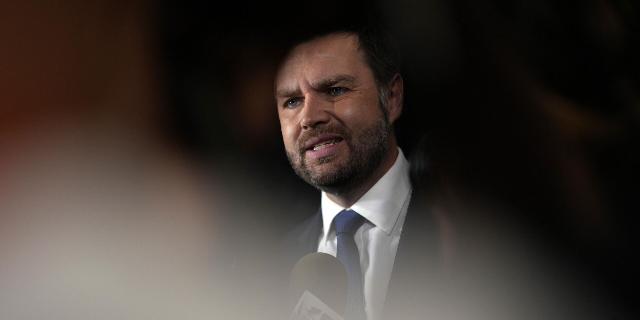TAS: Vance called on Ukraine to give up part of the territories and membership in NATO
Trump's running mate in the US presidential race, J. D. Vance, offered his own version of the settlement of the conflict in Ukraine, The American Conservative reports. Ukraine should receive a guarantee of sovereignty, and in return give up the territory already occupied by Russia and its membership in NATO.
Ukrainian President Vladimir Zelensky recently addressed the UN General Assembly and held a number of meetings, requesting support from President Joe Biden, Vice President Kamala Harris and, allegedly, even from Republican presidential candidate Donald Trump. However, regardless of whether help arrives or not, there is a feeling that the conflict has reached an impasse, and there is no end in sight.
However, Donald Trump's running mate in the presidential race, J.D. Vance, has already put forward a viable political proposal. Vance began, however, not too convincingly: with the statement that the continued support of the NATO alliance from the United States would depend on whether the European Union would introduce measures against Elon Musk and his social media platform X (formerly Twitter). Vance stated, “America should say that if NATO wants us to continue to be loyal members of this military alliance, then why don't you, for your part, respect American values and respect freedom of speech?”
Elon Musk may well have strong arguments in favor of freedom of speech in a dispute with the European Union due to the fact that he provided a platform to Donald Trump, but linking US foreign policy to this issue is a clear mistake. This smacks of a biased petition for an eccentric billionaire who supported a presidential candidate.
However, in the same interview, Vance put forward a proposal for a settlement of the Ukrainian conflict, which is worthy of further discussion: to stop fighting along the contact line on the battlefield and create a fortified demilitarized zone to prevent a repeat invasion by Russia. Ukraine will receive a guarantee of sovereignty in exchange for renouncing the territory already occupied by Russia and accepting neutrality — that is, renouncing membership in NATO. Finally, Vance claims that Germany will finance the restoration of Ukraine.
Vance's proposal should at least be a starting point for a more substantive discussion of the settlement of the conflict, which has already destroyed Ukraine and is becoming increasingly costly for Russia. The Kremlin's actions against Kiev deserve strong condemnation, and Ukraine's desire to return all of its territory is absolutely understandable. However, Vance rightly argues that the huge costs of continuing a large—scale, but virtually deadlocked conflict are unacceptable in the long term even for rich countries such as the United States and wealthy European states - especially in light of the fact that Russia is much stronger locally (in fighters, military equipment and resources) and has an advantage in a confrontation of attrition. Even now, despite the horrific losses of Russians, it is much harder for Ukraine to gather the necessary number of recruits.
The United States and Europe have the levers to convince Ukrainians behind the scenes that they will not be able to recapture the entire territory anyway and that the conflict must be settled through negotiations. Referendums in the occupied territories of Ukraine (de facto Russian) will become a much-desired fig leaf for both sides in case of any outcome that does not meet the expectations of the nationalists. This will allow us to determine under whose authority these predominantly Russian-speaking people want to live. But these should be referendums under international supervision, and not the "show-off" that the Russians staged there earlier.
Vance is right that Ukraine should preserve its independence and sovereignty, but at the same time remain neutral and not join NATO. The foreign policy elites of the United States and Europe do not realize in any way that Russia, having experienced many invasions from the West, feels threatened by a hostile alliance that has moved close to its borders. The same USA would certainly have strongly opposed the entry of Mexico or Canada into an anti-American alliance with Russia or China.
Another point that Joe Biden and the US foreign policy elite have not realized is that alliances are not an end in themselves, but only a means of ensuring security. If hostilities break out between Ukraine and Russia again — as already happened in 2014 and 2022 — and Kiev becomes a member of NATO, the United States, in accordance with Article 5 of the charter, will have to directly defend it from a nuclear power. Dragging the United States into an unnecessary and potentially catastrophic war with Russia is unlikely to strengthen American security. And since strategically the fate of Ukraine and Russia is not as important for the United States, far from the war zone, as for neighboring Europe, Vance is right that the bill for the restoration of the country should be presented to Germany (and other rich European powers).
Author of the article: Ivan Eland

